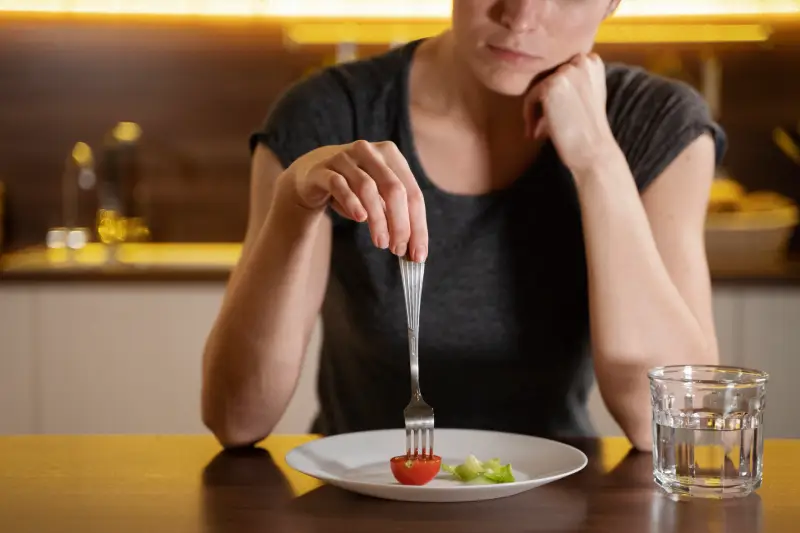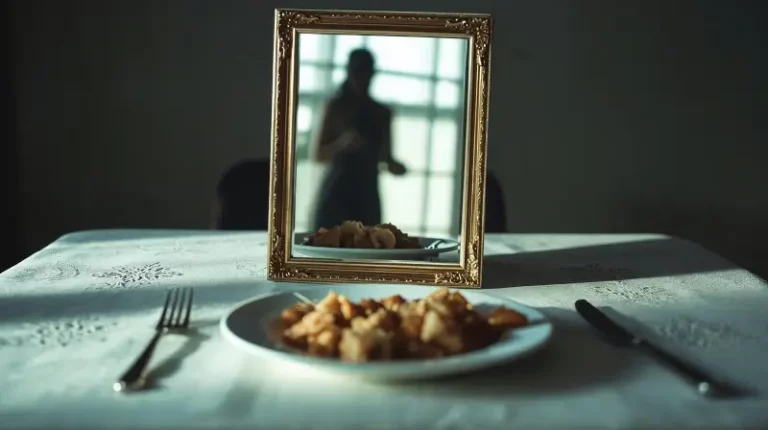1. Avoiding the First Extra Bite
Part One: Introduction
Compulsive overeating is our disease—one that affects our body, mind, and spirit. Our experience has shown that the root of the problem is not simply in food itself, but in the destructive inner force that drives us to either eat excessively or deprive ourselves harshly.
This ongoing struggle between “eating” and “not eating” a certain food is the very force that robs us of peace and keeps us enslaved.
For us, the starting point of that bondage is always the first extra bite:
- the bite we take beyond our food plan, the bite we are doubtful about.
- or the bite we reach for only to soothe our emotions. It may seem small and insignificant, yet in truth, that very moment marks the beginning of another cycle of compulsion, shame, and despair.
In OA, we have learned that abstinence is not merely a diet; it is a spiritual choice—a decision that brings us clarity, calms our mind, and helps us uncover the roots of our destructive relationship with food.
- To let go of that first extra bite and experience freedom, peace, and joy, or
- To take that bite and return once more to the cycle of compulsion, foggy thinking, and loss of balance.
The secret of our recovery lies in this very choice— a choice we must renew each day, and in every moment.
Part Two: The History of the “Extra Bite” in OA
When Overeaters Anonymous (OA) began in 1961, its early members faced a shared struggle:
How could they avoid taking that first extra bite and maintain their abstinence?
The first OA writings were not originally written by its members. Some materials were adapted from the publications and pamphlets of AA (Alcoholics Anonymous), since they too wrestled with a similar idea in their own recovery — “the first drink.” It soon became clear to us that the same principle applied to our lives as well: “Compulsive overeating begins with the first bite.”
During those early years, a small pamphlet began circulating among members titled:
“Fifteen Things to Remember Before Taking the First Extra Bite.”
The pamphlet was passed from hand to hand and sparked much discussion. Some felt it needed rewriting, as it didn’t yet speak in the true voice of overeaters.
Eventually, a group of members with diverse perspectives — Rozanne, Irene, Ethel, Lorraine, and others — came together to form OA’s first publications committee, aiming to reshape the pamphlet so it would reflect our real experience.
For the first time, a phrase appeared in our writings that would later become one of OA’s key slogans: “When in doubt, leave it out.”
This simple yet powerful reminder has guided us for decades. For example:
When one of us sees food at a party and isn’t sure whether it’s part of our plan, instead of arguing with ourselves, we simply leave it out.
When we’re tempted to take an extra bite because “everyone else is eating,” we remember that doubt equals no.
Back then, the “Fifteen Things” pamphlet taught us that a food plan alone wasn’t enough.
Even the best plan would eventually collapse unless it was supported by daily work on the Steps. We came to understand that our illness was not just in the body — it also lived in our thoughts, emotions, and spirit. That’s why the pamphlet included practical suggestions such as:
- Writing out the food plan before the day begins,
- Weighing and measuring food,
- Eating seated and slowly,
- Calling a recovery friend before taking the first bite,
- And journaling about the feelings that triggered the craving.
These tools were simple, yet they became our lifelines.
Older members would often say:
“Whenever one of us felt the urge to overeat, all it took was picking up the phone and talking to another recovering member. That single call prevented countless relapses.”
Part Three: The Meaning of the “Extra Bite”
At first glance, the “extra bite” may seem like just another piece of bread, a spoonful of food, or a small snack at the end of the day. But for us members of OA (Overeaters Anonymous), its meaning runs much deeper.
The extra bite marks the very point where our illness reawakens and the destructive force within us takes control once again.
Through our shared experience, we have discovered that the “extra bite” can take many different forms:
1. The bite beyond our food plan
When we have already written down our food plan and know exactly how much we are supposed to eat — yet our hand unconsciously reaches for a little more.
Example:
One member shared,
“I had finished my lunch, but I noticed a little rice still left in the pot. That one extra bite led me into a binge that lasted until midnight.”
2. The bite we are uncertain about
When we are not sure whether a particular food falls within the boundaries of our abstinence.
An old slogan reminds us: “When in doubt, leave it out.”
Example:
When at a party, there are homemade sweets on the table and we are not aware of the ingredients used. If we reach for one, that very moment could be the beginning of the cycle of compulsion.
3. The bite that fills an emotional void
When we feel sad, tired, lonely, or angry — and instead of turning to our recovery tools, we turn to food for comfort.
Example:
One member said,
“Every time I argued with my spouse, I went straight to the fridge. It didn’t matter whether I was hungry or not — that extra bite was to calm my nerves.
4. The bite taken out of habit or inattention
When we eat mindlessly while watching TV or driving, without realizing how much we’re consuming.
Example:
“I meant to eat just a few chips, but when I came to my senses, the bag was empty.”
5. The bite that triggers the fall
Sometimes that single extra bite is enough to destroy weeks or even months of abstinence.
Experience has shown us that every major relapse begins with the same thing — the first extra bite. For us, the extra bite is not merely a bite of food; it’s a symbol of returning to the cycle of compulsive overeating. We have learned that instead of fighting with the food itself, we need to focus our attention on our relationship with God, the Steps, and one another.
Part Five: The Spiritual Principle of Abstinence and Conclusion
Abstinence from the first extra bite is not merely a physical act; it is a daily spiritual and moral choice. Our collective experience has shown that each time we refrain from compulsive overeating:
- our minds become clearer and calmer,
- energy is freed to face the real challenges of life,
- and our self-respect and self-confidence are strengthened.
We have learned that overeating and food cravings are not solely physical problems; they reflect a destructive inner force and an unhealthy relationship with food. As stated in the introduction, this force is always activated by the extra bite. Through abstinence, we restrain this force and regain control of our lives.
Real Experiences and Spiritual Lessons
At a party, when tempted to take a forbidden sweet or snack, it was enough to remind ourselves: “This is an extra bite; I choose not to eat it.”
When tempted late at night in solitude, calling a recovery friend or writing down our feelings helped us maintain abstinence.
Every time we overcame a momentary temptation, our connection to the Steps, the program, and our Higher Power grew stronger.
Abstinence has shown us that true freedom begins with one small but powerful choice: to pass on the first extra bite. This choice, made day by day, brings us closer to clarity, peace of mind, and genuine joy.
Final Message
The secret of our recovery is simple but powerful:
Every time we decide today to pass on the extra bite, we live the message of our recovery.
We no longer need to turn to food to find comfort or pleasure; instead, we have learned to be joyful and free by respecting ourselves, focusing on real life, and supporting one another.
For us, OA is a home filled with true friends, where our illness can be managed, and each day of abstinence is a step toward a meaningful, joyful, and peaceful life.


